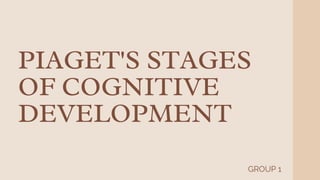
G1_Piaget's 4 stages of Cognitive Development.pptx
- 2. 2 • Describe Piaget's stages in your own words. • Conduct a simple Piagetian task interview with children. • Match learning activities to the learner's cognitive development. I LEARNING OUTCOMES:
- 3. 2 • Conducted research on cognitive discipline for over 60 years. • His research methods involves the “Piagetian Task”. • Called his general theoretical framework “Genetic-Epistemo-logy”. • Came up with the “Stages of Cognitive Development”. • His theory has been applied widely to teaching and curriculum design. 2022 April 24 I Jean Piaget (1896- 1980)
- 4. 2 II Piagetian Task • Observing a small member of individuals as they responded to cognitive task.
- 5. 2 III METHODOLOGY • Refers to how children think, explore and figure things out. It is the development of knowledge, skills, problem solving and dispositions, which help children to think about and understand the world around them. Cognitive development
- 6. 2 V BASIC COGNITIVE CONCEPTS Schema • refer to the cognitive structures by which individuals intellectually adapt to and organize their environment. Assimilation • the process of fitting a new experience into an existing or previously created cognitive structure or schema.
- 7. 2 IV Accommodation Equilibrium • the process of creating a new schema. • achieving proper balance between assimilation and accommodation.
- 8. 2 I COGNITIVE DISEQUILIBRIUM • when our experiences do mot match our schemata (plural of schema) or cognitive structures.
- 10. 2 • ability of the child to know that an object still exist even when out of sight. I STAGE 1: SENSORI-MOTOR STAGE (BIRTH TO INFANCY) • The stage when a child who is initially reflexive in grasping, sucking and reaching becomes more organized in his movement and activity. Object permanence
- 11. 2 II STAGE 2: Pre-operational stage (2-7 years old /Pre school years) • Intelligence is intuitive in nature. • The child can now make mental representation and is able to pretend, the child is now ever closer to the use of symbols.
- 12. 2 V THIS STAGE IS HIGHLIGHTED BY THE FOLLOWING: Symbiotic function • ability to represent objects and events. Egocentrism • tendency of the child to only see his point of view and to assume that everyone also has his same POV. Hence, the child cannot take the perspective of others. Centration • tendency of the child to only focus on one aspect of a thing or event and exclude other aspects.
- 13. 2 V THIS STAGE IS HIGHLIGHTED BY THE FOLLOWING: Irreversibility • the inability to reverse their thinking. Animism • tendency of children to attribute human like traits or characteristics to inanimate objects. Transductive Reasoning • type of reasoning that is neither inductive nor deductive.
- 14. 2 IV Inductive Reasoning Deductive Reasoning • act of making generalized conclusion based on specific scenarios. • act of backing up a generalized statement with specific scenarios.
- 15. 2 V STAGE 3: Concrete-Operational stage (between 8-11 years old/Elementary school years) • Ability of the child to think logically but only in terms of concrete objects.
- 16. 2 IV CONCRETE-OPERATIONAL STAGE IS MARKED BY THE FOLLOWING: Decentering Reversibility • ability of the child to perceive the different features of objects and situations. • the ability to follow certain operation in reverse.
- 17. 2 IV Conservation Seriation • ability to know that certain properties of objects like number, mass, volume or area do not change even if there is a change in appearance. • ability to order or arrange things in a series based on one dimension (i.e., weight, volume or size).
- 18. 2 • Thinking becomes more logical. • They can now solve abstract problems and can hypothesize. I STAGE 4: FORMAL OPERATIONAL STAGE (BETWEEN 12-15 YEARS OLD)
- 19. 2 V THIS STAGE IS CHARACTERIZED BY THE FOLLOWING: Hypothetical reasoning • ability to come up with different hypothesis about a problem and to gather and weigh data in order to make a final decision or judgement. Analogical reasoning • ability to perceive the relationship in one instance and then use that relationship to narrow down possible answers in another similar situation or problem. Deductive reasoning • ability to think logically by applying a general rule to a particular instance or situation.
- 20. 2 II From Piaget’s findings and comprehensive theory we can derive the following principles: 1. Children will provide different explanation of reality at different stages of cognitive development. 2. Cognitive Development is facilitated by providing activities or situation that engage learners and require adaptation (i.e., assimilation and accommodation). 3. Learning materials and activities should involve the appropriate level of motor or mental operations for a child of given age;. Avoid asking student to perform task that are beyond their current cognitive capabilities. 4. Use teaching methods that actively involve students and present challenges.